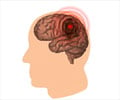In chronic stroke patients with aphasia, robotic arm rehabilitation was found to promote speech and language function recovery.

‘Robotic arm rehabilitation is a commonly-used intervention for treating impaired motor function in the arm, wrist, or shoulder subsequent to stroke. ’





This research was led Adam Buchwald, Associate Professor of Communicative Sciences and Disorders at NYU Steinhardt's School of Culture, Education, and Human Development, as well as Carolyn Falconer-Horne, a recent Ph.D. graduate of the department. "While this is an initial finding that should be interpreted cautiously, it remains exciting to consider the possibility that stroke rehabilitation in one domain would improve performance in another domain, said Buchwald. "It remains possible that some treatment approaches encourage plasticity and reorganization that can span multiple domains, most likely those with similar neural substrates. Further testing of these combined effects could lead to breakthroughs in our approach to stroke rehabilitation for individuals with complex deficits affecting mobility, speech and language processing, and other cognitive domains."
The research team was assembled following an initial observation by Weill Cornell Medicine's Dylan Edwards, Ph.D., P.T., that participants may be speaking better following 12 weeks of robotic arm treatment. Falconer-Horne, along with Buchwald and Edwards, designed a battery to evaluate possible changes in participant performance that formed the basis of the analyses in this paper.
Source-Eurekalert















